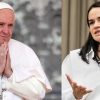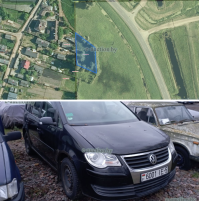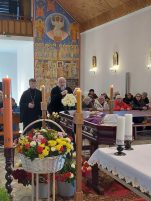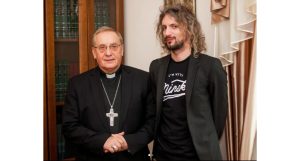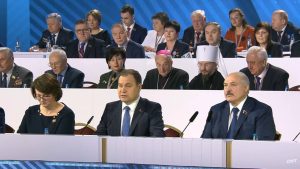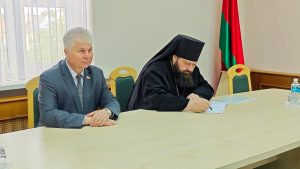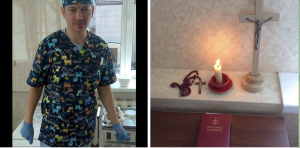Sviatlana Tsikhanouskaya’s letter to the Holy Father Francis
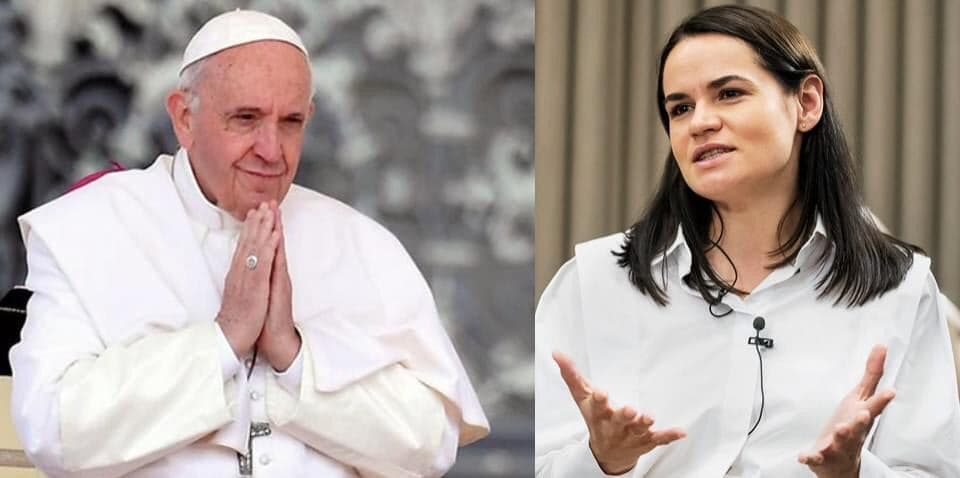



Sviatlana Tsikhanouskaya’s letter to the Holy Father Francis, Bishop and Pope of Rome, inspired by his new encyclical Fratelli Tutti:
“Fraternal Society: A Vision For a New Belarus”
Your Holiness,
My letter is a response to the invitation to dialogue to which you call all people of goodwill in your new encyclical, Fratelli Tutti. This address is inspired by your proposed “vision of fraternal society” (§4), in which “by acknowledging the dignity of each human person, we can contribute to the rebirth of a universal aspiration to fraternity” (§8). In this letter, I want to share the dreams of the Belarusian people, which they “dream together” and which are “built together” (§8).—dreams that resonate with the vision of a fraternal society, ways to implement what you discuss in your encyclical. I want to share these dreams, but also the obstacles and difficulties we face along the way. Therefore, my letter also includes many questions.
For decades, Belarusian society was subject to the worst form of alienation as identified by the encyclical—“feel[ing] uprooted, belonging to no one” (§53). The Belarusian people have survived since ancient times thanks to communal solidarity and self-organization —one of its forms, talaka, was widespread among Belarusians. But having survived centuries of wars, poverty, oppression, repression, and various cataclysms, including the accident at the Chernobyl nuclear power plant, in the mid-1990s the Belarusians chose a government that promised stability and security. As it turned out, this was at the cost of freedom, the right to elect, and independence.
The contemporary state authorities, which operate on the principle of a rigid hierarchy, with power concentrated in the hands of one person, have prevented, in every way, any forms of community expression and solidarity, except that which is authorised from above. Any joint action within associations—whether by non-governmental organizations, religious communities, political parties, or trade unions—has been either banned or tightly controlled and suppressed. The words “democracy, freedom, justice, [and] unity” (§14) and even the very word “people” (§157) have been uttered constantly, but were perceived as empty sounds and demagoguery, because they were used for manipulation, as tools of domination and as justifications for deception, cruelty, and violence.
There has been a complete alienation of the people—people who are the source of sovereignty—from the state, from the sphere of decision-making. Those who have tried to say something, to effect change, to offer an alternative, have been subjected to repression: activists, human rights defenders, and politicians have been expelled from universities, dismissed from work, and arrested. In 2010, seven out of ten presidential candidates were detained, some of whom spent months or years in detention. On the one hand, participation in political activities and expressing one’s opinion and position could neither influence nor change anything; on the other hand, it was a great risk for oneself, one’s family, one’s community, one’s affairs. Passivity, dictated by powerlessness and fear, has dominated Belarusian society, and it was this that, in the language of the regime, was called “peace.” In effect, Belarusian society has gradually become atomized and individualized, “a mere aggregate of individuals” (§157).
As the entire world began to face the coronavirus pandemic, the authorities of Belarus relied on a strategy of ignoring the problem, while doctors, nurses, and other health workers, who put their lives on the line to fight this new sickness, were left completely unprotected. After the Chernobyl accident in the late 1980s, when the Soviet government hid information about the true scale of the disaster and did not take any measures to prevent the effects of radiation on public health and lives; likewise now, during this pandemic, the state authorities have tried to convince people that there is no danger, that the situation is under control, underestimating the figures of the sick and dead, showing a disregard for common sense and for scientific research and, most importantly, displaying disrespect for the life and human dignity of their citizens. In contrast, in the face of this common struggle, Belarusian citizens have united in volunteer initiatives to help medical workers; the people’s solidarity with the medics during COVID-19 is a prime example of their sense of humanitarian mission.
In June 2020, hundreds of thousands of residents of Minsk were deprived of access to drinking water for several days when a serious accident occurred and poisonous substances entered the water supply system. A foul-smelling liquid, completely unfit for drinking, flowed from the taps in people’s homes. The authorities, instead of organizing access to water supplies, denied the very existence of the problem and provided false information about the quality of water. But again, the people themselves united in one large network of mutual aid and transported water from some districts to others.
As a result, on the one hand, public trust in state leadership was completely undermined, and it became obvious that state policy was based on lies and, instead of helping people, public bodies are ready to sacrifice health and lives; on the other hand, a vision of a community, of brotherhood and sisterhood, was born out of mutual assistance and solidarity. The Belarusian people, previously divided, has realized that such a community is a value and an ideal that should not only be pursued in the future but should be implemented now at the level of civil society, despite the obstacles of state institutions and in the face of lawlessness and an authoritarian political regime.
During the recent election campaign, many people had a dream and a vision of a society in which the voice of everyone matters, in which “at the centre of all political, social and economic activity” stands “a human person, who enjoys the highest dignity” (§232), in which conflicts are not hidden and silenced but resolved “through dialogue and open, honest and patient negotiation” (§244), in which there is space for genuine dialogue without “empty diplomacy, dissimulation, double-speak, hidden agendas and good manners that mask reality” (§226).
The desire for unity and solidarity, and the emergence of the self-understanding of a people that has a common goal and desire—despite belonging to different social groups, holding different political beliefs, having different geopolitical orientations, and being motivated by individual interests—have become an incentive for the birth of a political community. Having come together in the face of shared adversity, people have seen clearly the creative power of solidarity and mutual assistance.
The authorities have habitually hindered the process of unification and political activation by throwing leaders in prison on trumped-up charges (my husband, Siarhei Tsikhanousky, was among them), by refusing to acknowledge the signatures collected for nominations for the presidential elections and, by preventing the society from forming election commissions and observing the election process. In response to this repression, more and more solidarity and self-organization has arisen within society itself; overcoming fear and familiar inertia, people have joined a common struggle for honest, fair, and transparent elections.
Believers and clergy of the Roman Catholic Church have been very actively involved in this process: at the initiative of Artiom Tkaczuk, a missionary and social worker, the campaign “A Catholic Does Not Falsify” was launched. Its task was to promote among the broad Catholic community the idea that fair elections are not only a political issue but also a moral one that has to do with faith and living according to one’s faith.
Regardless of their political beliefs, people have been united by the desire for fair, transparent, and democratic elections on the road to change, on the road to justice, on the road to the common good. It so happened that I, Sviatlana Tsikhanouskaya, an ordinary Belarusian woman, who, like most Belarusians, was not interested in politics, was passive, and was engaged mainly in the education of my own children, had to take on this mission to become the leader of the movement for fair and just elections. Maria Kalesnikava and Veronika Tsepkalo shared this fate with me. Each of us embarked on this path not for the sake of power, but to restore belief that the voice of every human being is meaningful, that solidarity can work miracles, that love and non-violence are stronger than violence.
This path has not been easy for us. The Belarusian people have suffered the fate of the traveller from Jerusalem to Jericho in the parable of the Good Samaritan (Luke 10:25-37): “he fell among robbers, who took off his clothes, wounded him and departed, leaving him barely alive.” The Belarusian people were robbed: their votes in the elections and their right to know the truth about the election results were stolen. “There is only one way out,” Bishop Aleh Butkevich told the Belarusian people: “We need to look for the truth!.. But the truth will not be where there is violence.”[1] Metropolitan Tadeusz Kondrusiewicz supported people in their legitimate quest for truth: “People have a right to know the truth, which cannot be sacrificed to someone’s political or economic interests.”[2]
Driven by the search for the truth about the election results, not allowed to be present at the vote count, people went out to a peaceful demonstration. In response, citizens, journalists, and bystanders were fired at with stun grenades and rubber bullets, beaten, arrested, tortured, and subjected to inhumane and degrading treatment, and their children were forcibly taken away into orphanages. The health of thousands of people was seriously harmed, and some Belarusians even lost their lives—Aliaksandr Taraykouski, Henadz Shutau, Aliaksandr Vikhor, Kanstantsin Shyshmakou, Mikita Kryutsou, and Raman Bandarenka. Belarusians, bloodied, with broken teeth, with torn bellies, with broken arms and legs, wounded, unable to even scream in pain, were thrown onto the floor in prisoner transport vehicles, on the ground in the yards of police stations, and on the concrete floors of prisons, feeling completely helpless.
In response to this horrific violence, women took to the streets of Belarusian cities; then doctors, musicians, athletes, scientists, students, pensioners, and people with disabilities followed. Archbishop Artemy of Hrodna, of the Belarusian Orthodox Church, called the women’s protest—in which wives, mothers, and sisters of beaten husbands, sons, brothers came out to the streets with flowers and smiles—a real miracle, the implementation of the spiritual law: “Don’t be defeated by evil, but defeat evil with good!” (Romans, 12.21). Thus, love “returned peace and stopped violence”—it became a healing force “from the toxins of evil and aggression” [3]. Petra Bosse-Huber, a bishop of the Evangelical Church in Germany, saw in the brave Belarusian women who follow the path of peace and love and implement the principle of this spiritual law “the image of Mary, protecting and covering with her protecting veil” [4]. The Roman Catholic bishop Yuri Kasabucky also compared Belarusian women with Mary, who stood by the cross without fear and looked at the suffering of her Son: “You took the flowers, you came out, you stood, you showed the world, which confused all people… Your smiles—you just amazed everyone; everyone was in shock… You came out and you have started defeating evil with good… You may have defeated the devil without knowing it… Our Belarusian girls, women, our daughters, sisters, wives, mothers, grandmothers—you are heroes of our time” [5].
Christian women were also among the first to organize special prayers for Belarus amid a growing wave of violence and lawlessness against peaceful protesters. On August 12, Catholic believer Irena Bernatskaya from the city of Lida began to pray the rosary daily in the form of the Rosary Novena to Our Lady of Pompeii, for peace in Belarus, for which she was subjected to a large fine on October 16. On August 13, several Orthodox women from Minsk initiated ecumenical prayers in the centre of the city, in the square between the Holy Spirit Orthodox Cathedral and the Catholic Arch-Cathedral of the Holy Name of the Blessed Virgin Mary. Orthodox, Catholics, Protestants prayed together and then passed in procession with banners, icons, and Bibles through the streets of the city. A group of women believers in Minsk also goes out every evening to pray the rosary for Belarus and for the return from exile of Archbishop Tadeusz Kondrusiewicz. A young Greek Catholic believer Marysia Bulatouskaya from Vitebsk was fined for being near a peaceful procession and praying. On October 4, an elderly believer from Brest, Elena Gnauk, knelt between protesters and the police, praying for peace, and for this was punished with 18 days in detention, and now faces the threat of criminal prosecution.
Many ministers from different churches did not become like the priest and the Levite in the parable; they did not pass by, afraid to be desecrated by “worldly affairs.” Their answer was prayer, mercy, and the raising of their voices against violence and lawlessness.
Two large interfaith prayers were held in Minsk and Hrodna. In Minsk, on the initiative of Archbishop Tadeusz Kondrusiewicz, on August 19, an inter-religious prayer for peace in Belarus took place —it was the Catholic archbishop who initiated such a prayer, attended by priests of the Catholic, Orthodox, Protestant churches, as well as Belarusian Jews and Muslims. In Hrodna, at the general initiative of religious organizations of different denominations, on August 16, in the historical city centre, an interfaith prayer procession was organized with posters of spiritual content and against violence, for the peaceful resolution of the political crisis and the release of the innocent people arrested. Clergy and believers of five Christian denominations, as well as representatives of the Jewish community, took to the streets.
Protestants prayed daily in the centre of Minsk and special services were held in many Orthodox, Catholic and Protestant churches. In Hrodna, the Orthodox churches rang their bells every hour. In September, at the initiative of Archbishop Tadeusz Kondrusiewicz, the Roman Catholic Church held a pilgrimage to the statue of the holy Archangel Michael, patron saint of the Roman Catholic Church in Belarus and defeater against evil, with the intention of a speedy resolution of the social and political crisis. Under Pavel, the Orthodox Metropolitan of Minsk, who followed the initiative of the faithful women who began prayers near the cathedral, prayers for Belarus became a daily occurrence. The new leader of the Belarusian Orthodox Church, Metropolitan Veniamin of Minsk, who succeeded Metropolitan Pavel, called twice for the congregation to fast for several days. Prayers and processions were held in many communities throughout Belarus, despite the fact that even prayers for Belarus became dangerous: in Vaukavysk, about fifteen participants in prayer for Belarus, which were held in the Orthodox Church of Saints Methodius and Cyril, Equal to the Apostles, were detained.
Priests also showed mercy and expressed solidarity with suffering. From the first days of the protests, the Greek Catholic priest Ihar Kandratsieu joined the protesters in Brest with prayers and words of support, spending days in the streets of the city and under the walls of the local prison, seeking the release of the beaten detainees. For this, he was pressured and threatened with the de-registration of his community. Orthodox, Catholic, and Protestant priests also met by the walls of detention centres, where detainees and those arrested were held, while in the tent camp of volunteers near the prison of Akrestsina there was a prayer corner. Orthodox and Catholic priests in Hrodna and Minsk tried to pass on water, food, basic necessities, and hygiene products to the prisoners. Priests came to court—in Vaukavysk, Orthodox priests came from different cities of Belarus to support their colleague, priest Alexander Bogdan, who was tried twice. Priests of four Christian denominations came to Hrodna for the trial of the renowned surgeon, believer Alexander Tsylindz.
Some priests also went out to openly protest against the violence and lawlessness committed. On August 13, Orthodox priest Vladimir Drobyshevski took to the streets of the city of Homiel with a poster “Stop the violence”. In September, he was convicted twice in succession and held in custody for 25 days. On the very first evening after the elections on August 9, two Roman Catholic Priests of the Sacred Heart of Jesus were jailed—Eduard Sinkevich (10 days) and Alexander Fedotov (8 days). In different cities, priests stood in chains of solidarity and supported peaceful people, and in Lida, Orthodox priests treated women with ice cream. Many opened the doors of Orthodox and Catholic churches so that peaceful protesters could escape from unjust violence and brutality by the police, and were coming out of the churches to talk to the police (in Żodzina, Lida, Hrodna and Minsk)—but this did not always help. Thus, on August 26, the police blocked peaceful protesters and journalists in the Red Church of St. Simeon and Elena in Minsk, and on September 11, several women of faith were brutally detained at the entrance to the church.
In addition, priests posted on social networks and blogs, delivered sermons, spoke in the media, wrote poems, but—most importantly—listened to numerous stories of violence and torture, held people by the hand, hugged them by the shoulders, wiped away tears, cried with those crying, comforted those who grieved, prayed for those who suffered from bodily and mental wounds, provided material assistance, and stood by their parishioners. Twice a week in his video blog on YouTube Viachaslau Barok, a Roman Catholic priest from a small town of Rasony, offered reflections on the encyclical Fratelli Tutti and applying the social doctrine of the Church to our daily life. On 12 November 2020, the local Investigative Committee department summoned the priest for interrogation. He is currently facing a criminal prosecution [6]. Roman Catholic priest Viačaslau Barok from small town of Rasony, in his Youtube blog twice a week proposed reflections on the encyclical Fratelli Tutti, and on the social doctrine of the Catholic Church in its application to the social life. November 12 he was summoned to interrogation to local investigative committee, and now faces a criminal prosecution [6].
In their official statements, the Belarusian churches called for dialogue and peace. On August 16, the Synod of the Belarusian Orthodox Church declared the need to end the violence [7]. In August, fifty Protestant pastors wrote to the people of Belarus [8]. This attempt to participate in a peaceful resolution of the crisis is commendable. The main generator of dialogue, who in various ways tried to find a “architecture of peace” (§231) that could work, was the Metropolitan Tadeusz Kondrusiewicz.
He was the very first to speak up, on August 11, declaring the need for dialogue [9] and a few days later calling on the authorities to “start a constructive dialogue with society, stop the violence, and release all innocent civilians detained at peaceful rallies” [10]. On August 21, Metropolitan Kondrusiewicz even initiated a meeting with Interior Minister Yuri Karayev to personally raise questions about the unrestricted violence used by police officers against civilians. Metropolitan Kondrusiewicz tried using all possible means to find ways to resolve the situation and relieve tension—through prayer, interfaith cooperation, calls for dialogue, and appeals to the state authorities. Tadeusz Kondrusiewicz became an example of a religious leader among those who are “called to be true ‘people of dialogue’” (§284). He became an example of an “authentic mediator” who, by raising his voice about the need for dialogue, “spends himself generously until he is consumed, knowing that the only gain is peace” (§284). He represented a church, “that serves, that leaves home and goes forth from its places of worship, goes forth from its sacristies, in order to accompany life, to sustain hope, to be the sign of unity… to build bridges, to break down walls, to sow seeds of reconciliation” (§276). However, to his words about peace, dialogue, mercy, truth, and non-violence, the authorities responded with repression, saying that it is not the church’s business to “interfere in politics” [11]—and the Metropolitan found himself in exile, in which he has been for more than two months.
We, the Belarusian people, want dialogue. For our part, we have created a dialogue platform—the Coordinating Council—which included authoritative representatives from politics, science, culture, business, media, sports, and charity, and religious communities were also invited to active participation. The Coordinating Council has a Christian Vision Working Group, which was created by theologians, priests, and active believers of the Orthodox, Catholic, and Protestant churches. It is an example of ecumenical cooperation and dialogue for the common good.
We seek truth and justice, an end to violence and the release of political prisoners, and new, fair, just, and democratic elections. This is not a struggle of political ideologies and clans, parties and social groups. It is a desire to live in a society built on a solid foundation of truth, justice, love, and dialogue. It is not only our right, but now it is our duty, because peace and forgiveness do not, as you yourself say, “forbid” justice to those who are subjected to injustice, does not “forbid” the defence of their rights, “but actually demand it” (§241).
But how should we build this dialogue? How can we demand justice if one party —the one that has weapons and power—is not going to return stolen votes or restore justice or stop violence and repression, but proposes only to “move on,” “to turn the page,” to accept injustice, saying that it is necessary “to look to the future” (§249)?
We also look to the future and dream of the future, but our vision of the new Belarus is a vision of a fraternal community of solidarity and mutual assistance, which we have experienced ourselves and continue to experience now, and which feeds our hopes for the future.
Despite all the repression and violence, the protest continues to be peaceful; moreover, the spirit of mutual help and solidarity grows in it, as leaven in dough. Our eyes have already seen, our ears have already heard, our hands have already touched, our mouths have already had a foretaste of the society that Belarus could be. We know what we want and what we aspire to—a new brotherly, united, inclusive Belarus, one that already exists in city quarters in which neighbours did not know each other yesterday and today gather to drink tea, treat each other with cake, sing and dance together. It exists in businesses: in private medical centres that provide free diagnosis and treatment for victims of police violence, in flower shops that give flowers to women, in confectionery shops that treat people with candy, and in service stations that repair cars for free. This society shows itself in a street choir of pensioners singing the spiritual anthem “Mahutny Boża” (Almighty God), in the lectures of philosophers in the playground, in the sincere prayer of Orthodox and Protestant believers at the Red Church in support of the exiled Catholic archbishop. It is being born in workers’ teams, in university classrooms, in art studios, in prayer circles, in village clubs. The faces and actions of the Belarusian peaceful movement are so different, “involving millions of actions, great and small, creatively intertwined like words in a poem” (§169), but we all live with one dream and one vision—the fraternal society.
Three months after the beginning of the protests, another tragedy happened. On November 11, a 31-year-old artist and activist, Raman Bandarenka, was kidnapped by unknown persons in the courtyard of his own house, after which he ended up at the police station. From there, he was taken to hospital in a coma after being severely beaten. The next day, he died. The death of Raman shocked the entire Belarusian society. Believers of different traditions—Orthodox, Roman and Greek Catholics, Protestants and others—gathered to pray for the repose of his soul. At the mass in the Minsk Catholic Cathedral , there were no fewer people than at Christmas and Easter. On Sunday, November 15, people from all over Minsk came to the courtyard where Raman lived to honor his memory. However, the authorities reacted extremely harshly—more than a thousand participants in the mourning procession were arrested and the spontaneous memorial of candles and flowers was destroyed. There are more and more victims, but the state does not see the problem; not a single criminal case has been initiated against those responsible for these atrocities. Instead, the Prosecutor’s Office has punished the Vicar Bishop Yury Kasabutsky and Father Sergiy Lepin, the press secretary of the Belarusian Orthodox Church, with a warning for publicly condemning the destruction of his memorial. The death of Raman, as well as the suffering of all the people, does not let us stop—but it makes us look for answers to our questions…
How much longer do we have to go down this path? How many more will be arrested, fired from their workplaces, beaten and expelled from the country, before our voice is heard by the authorities? Who will help us stand up and heal our wounds? Who will help us restore justice? When will Metropolitan Tadeusz Kondrusiewicz, who tried to be the voice of the Church and the voice of the people, return to Belarus? Will the voice of the Church and the voice of the people be able to break through the armoured windows of cars, through the shields of the police, through the disabled Internet? What prophetic word has the power to tear down these walls and build bridges?
On behalf of Belarusian people, we ask for Your holy prayers and Your genuine word of truth and justice, which will be a blessing for all of us,
Sviatlana Tsikhanouskaya
Leader of Democratic Belarus
————————-
[1] Выйсце адно — шукаць праўду. Біскуп Віцебскі Алег Буткевіч выступіў са Зваротам з нагоды масавых пратэстаў у краіне, 12/08/2020 // https://catholic.by/3/news/belarus/11996-vyjstse-adno-shukats-pra-du-b-skup-v-tsebsk-aleg-butkev-ch-vystup-sa-zvarotam-z-nagody-masavykh-pratesta-u-kra-ne (In Belarusian)
[2] Зварот арцыбіскупа Тадэвуша Кандрусевіча да дзяржаўных уладаў Рэспублікі Беларусь, 14/08/2020 // https://catholic.by/3/news/belarus/12014-zvarot-artsyb-skupa-tadevusha-kandrusev-cha-da-dzyarzha-nykh-ulada-respubl-k-belarus (In Belarusian)
[3] Обращение Архиепископа Артемия Гродненского и Волковысского, 14/08/2020 // https://belarus2020.churchby.info/obrashhenie-arxiepiskopa-artemiya-grodnenskogo-i-volkovysskogo/, (In Russian); Öffentlicher Appel von Artemij, Erzbischof von Grodno und Volkovysk, 14/08/2020 // https://belarus2020.churchby.info/offentlicher-appel-von-artemij-erzbischof-von-grodno-und-volkovysk/ (In German)
[4] Bild der schützenden und schirmenden Maria ist wie ein Vorbild, EKD-Auslandsbischöfin bekundet Solidarität mit Mitgliedern der Arbeitsgruppe „Christliche Vision“ des oppositionellen Koordinierungsrates für Belarus, 12/10/2020 // https://www.ekd.de/bild-der-schuetzenden-und-schirmenden-maria-ist-wie-ein-vorbild-59577.htm (In German)
[5] Казань біскупа Юрыя Касабуцкага, Генеральнага вікарыя Мінска-Магілёўскай архідыяцэзіі, 5/09/2020 // https://belarus2020.churchby.info/kazan-biskupa-yuryya-kasabuckaga-generalnaga-vikaryya-minska-magilyoўskaj-arxidyyacezii-5-09-2020/ (In Belarusian)
[6] 15 November, Fr. Viachaslau Barok issued his appeal addressed Your Holiness // https://www.youtube.com/watch?v=CajfYcdOQzg (In Belarusian, additional subtitles available in Russian, English, German, Polish)
[7] Обращение Синода Белорусской Православной Церкви к народу Республики Беларусь о прекращении народного противостояния, 15/08/2020 //. http://www.church.by/news/obrashenie-sinoda-belorusskoj-pravoslavnoj-cerkvi-k-narodu-respubliki-belarus-o-prekrashenii-narodnogo-protivostojanija (In Russian)
[8] Открытое обращение Евангельских протестантских церквей к народу Беларуси, 20/08/2020 // https://belarus2020.churchby.info/otkrytoe-obrashhenie-evangelskix-protestantskix-cerkvej-k-narodu-belarusi/ (In Russian)
[9] Зварот арцыбіскупа Тадэвуша Кандрусевіча ў сувязі са складанай грамадска-палітычнай сітуацыяй у Беларусі, 11/08/2020 // https://catholic.by/3/news/belarus/11991-zvarot-artsyb-skupa-tadevusha-kandrusev-cha-suvyaz-sa-skladanaj-gramadska-pal-tychnaj-s-tuatsyyaj-u-belarus (In Belarusian)
[10] Зварот арцыбіскупа Тадэвуша Кандрусевіча да дзяржаўных уладаў Рэспублікі Беларусь, 14/08/2020 // https://catholic.by/3/news/belarus/12014-zvarot-artsyb-skupa-tadevusha-kandrusev-cha-da-dzyarzha-nykh-ulada-respubl-k-belarus
[11] Лукашенко: церкви, костелы — не для политики, 22/08/2020. БелТА. // https://www.belta.by/president/view/lukashenko-hramy-kostely-ne-dlja-politiki-403780-2020


